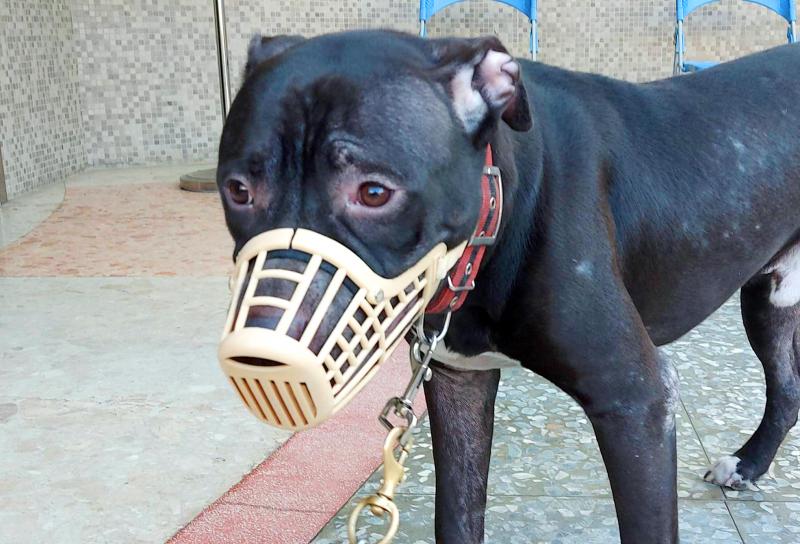Prospective dog owners should be aware that American pit bull terriers and American Staffordshire terriers can from March 1 no longer be owned without being registered, the Council of Agriculture (COA) has said.
The new regulations were introduced after a series of attacks by pit bull terriers, including one in which a three-year-old boy died after being attacked by a dog owned by his neighbors in Pingtung County in December last year.
The council categorizes six dog breeds as “aggressive”: pit bull terriers, Tosas, Neapolitan mastiffs, Brazilian mastiffs, Dogo Argentinos and other mastiffs.

Photo courtesy of the Kaohsiung City Animal Protection Office via CNA
Animal Husbandry Department Deputy Director Chiang Wen-chuan (江文全) asked owners of American pit bull terriers and American Staffordshire terriers to register their dogs before March 1, as the council listed those breeds in an amendment to the Animal Protection Act (動物保護法).
The amendment, which took effect on Oct. 26 last year, classifies the two kinds of terrier as “breed(s) of animals whose ownership, exportation and importation have been banned by the central competent authority,” he said.
Owners and importers of the two breeds who have acquired or are to acquire their dogs before March 1 must register them before Feb. 28 next year, he said.
The dogs must be registered in the city or county of residence of the owner, Chiang said, urging owners to inform the authorities of address changes.
The act also prohibits the breeding of American pit bull terriers and American Staffordshire terriers, he said.
Government-registered breeders would be allowed to continue to breed the dogs so long as they register all puppies after birth, Chiang said.
However, dogs born after the registration requirement comes into effect cannot be used for further breeding, he said.
Starting from March 1, owners of the two breeds may only sell their dogs to people with experience owning dogs of the respective breed, Chiang said.
Those who breach the new rules would face fines of NT$50,000 to NT$250,000, he said.
However, as the amendment closely defines the breeds affected, owners of other kinds of pit bulls would not face any additional curbs, Chiang said.
As pit bulls are generally classified as “aggressive,” they can only be walked in public by an adult, and must be leashed and muzzled at all times.
Department of Animal Industry data show that as of Dec. 15 last year, 199 American pit bull terriers and 31 American Staffordshire terriers had been registered, while registrations for 2,407 pit bulls of other breeds had been filed.

A preclearance service to facilitate entry for people traveling to select airports in Japan would be available from Thursday next week to Feb. 25 at Taiwan Taoyuan International Airport, Taoyuan International Airport Corp (TIAC) said on Tuesday. The service was first made available to Taiwanese travelers throughout the winter vacation of 2024 and during the Lunar New Year holiday. In addition to flights to the Japanese cities of Hakodate, Asahikawa, Akita, Sendai, Niigata, Okayama, Takamatsu, Kumamoto and Kagoshima, the service would be available to travelers to Kobe and Oita. The service can be accessed by passengers of 15 flight routes operated by

MORE FALL: An investigation into one of Xi’s key cronies, part of a broader ‘anti-corruption’ drive, indicates that he might have a deep distrust in the military, an expert said China’s latest military purge underscores systemic risks in its shift from collective leadership to sole rule under Chinese President Xi Jinping (習近平), and could disrupt its chain of command and military capabilities, a national security official said yesterday. If decisionmaking within the Chinese Communist Party has become “irrational” under one-man rule, the Taiwan Strait and the regional situation must be approached with extreme caution, given unforeseen risks, they added. The anonymous official made the remarks as China’s Central Military Commission Vice Chairman Zhang Youxia (張又俠) and Joint Staff Department Chief of Staff Liu Zhenli (劉振立) were reportedly being investigated for suspected “serious

ENHANCING EFFICIENCY: The apron can accommodate 16 airplanes overnight at Taoyuan airport while work on the third runway continues, the transport minister said A new temporary overnight parking apron at Taiwan Taoyuan International Airport is to start operating on Friday next week to boost operational efficiency while the third runway is being constructed, the Ministry of Transportation and Communications said yesterday. The apron — one of the crucial projects in the construction of the third runway — can accommodate 16 aircraft overnight at the nation’s largest international airport, Minister of Transportation and Communications Chen Shih-kai (陳世凱) told reporters while inspecting the new facility yesterday morning. Aside from providing the airport operator with greater flexibility in aircraft parking during the third runway construction,

American climber Alex Honnold is to attempt a free climb of Taipei 101 today at 9am, with traffic closures around the skyscraper. To accommodate the climb attempt and filming, the Taipei Department of Transportation said traffic controls would be enforced around the Taipei 101 area. If weather conditions delay the climb, the restrictions would be pushed back to tomorrow. Traffic controls would be in place today from 7am to 11am around the Taipei 101 area, the department said. Songzhi Road would be fully closed in both directions between Songlian Road and Xinyi Road Sec 5, it said, adding that bidirectional traffic controls would